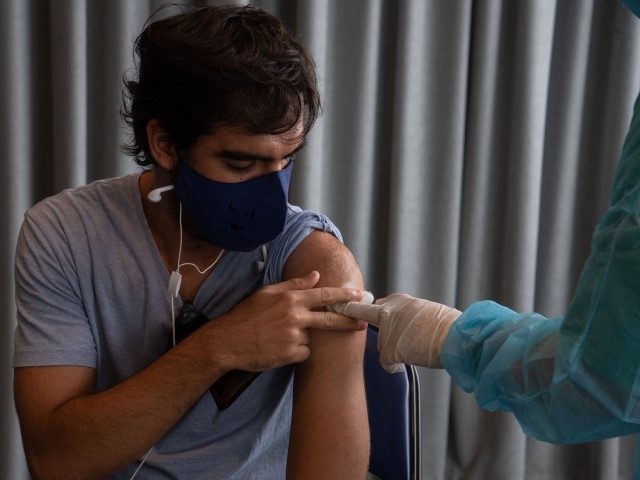The recent death of a 26-year-old New Zealand man from myocarditis, or inflammation of the heart muscle, was “probably due to vaccination” with a “Covid-19,” or Chinese coronavirus, vaccine produced by Pfizer, New Zealand’s Covid-19 Vaccine Independent Safety Monitoring Board (CVISMB) said on Sunday.
“With the current available information, the Board has considered that the myocarditis was probably due to vaccination in this individual,” New Zealand’s Ministry of Health wrote in a statement issued on December 19.
New Zealand’s Ministry of Health contracted CVISMB to investigate the recent deaths of three people in the country, all of whom died shortly after receiving Pfizer’s mRNA vaccine against “Covid-19,” or the Chinese coronavirus. “Covid-19” is the formal name of the disease caused by SARS-CoV-2, a type of coronavirus.
One of the deaths investigated by CVISMB was that of Rory James Nairn, 26. The resident of Dunedin, New Zealand, died on November 17 after having received his first dose of Pfizer’s coronavirus vaccine on November 5. Nairn’s fiancée, Ashleigh Wilson, posted a copy of a coroner’s report of his death to social media last week. The New Zealand Herald published excerpts of the document on December 17, noting it had “verified the report is legitimate.”
“It is my opinion that the cause of death is acute myocarditis, and in view of the history of symptoms since Covid-19 vaccination, and no other cause for myocarditis, is consistent with vaccine-related myocarditis,” the pathologist who conducted the autopsy wrote.
“Vaccination with the first Pfizer dose had occurred 12 days earlier and myocarditis-related symptomatology was reported thereafter,” the autopsy read.
“The pathologist said there were no other significant contributing factors linked to his [Nairn’s] death,” according to the Herald.

A medical staffer prepares a shot of COVID-19 vaccine at a vaccination center in Ramsgate, England, Thursday, Dec. 16, 2021. Leon Neal, Pool via AP
Nairn experienced “heart flutters” a few hours after receiving his first dose of Pfizer’s coronavirus vaccine on November 5, according to Wilson. The couple attributed Nairn’s heart palpitations to stressful events they were in the middle of at the time, including “selling and buying a house and planning a wedding,” Wilson told the Herald on December 17.
“We never, ever considered the events that followed,” she said.
According to Wilson’s account, the couple decided to visit a local hospital at 3:00 am on November 17 after Nairn’s symptoms worsened.
“We were about to leave for hospital and he was in the toilet and I heard a thud,” Wilson detailed.
“He had fallen, his body was blocking the door, I could see that he was gone,” she revealed.
Wilson said she called an ambulance and “paramedics tried for 40 minutes to resuscitate him but he was pronounced dead.”
Wilson told the Herald she “wanted to share her fiancé’s story to raise awareness about potential side effects from the [Pfizer] vaccine.”
“If you decide to get the vaccine and experience any side effects please seek medical advice immediately,” Wilson said.
“Cases of myocarditis … have occurred: After mRNA COVID-19 vaccination (Pfizer-BioNTech or Moderna), especially in male adolescents and young adults,” the U.S. Centers for Disease Control and Prevention (CDC) wrote in a notice posted to its website on November 12.
Pfizer and Moderna’s coronavirus vaccines have been shown to cause both myocarditis and pericarditis.
“Myocarditis is inflammation of the heart muscle, and pericarditis is inflammation of the outer lining of the heart. In both cases, the body’s immune system causes inflammation in response to an infection or some other trigger,” the U.S. public health agency writes.
These symptoms occur “more often after the second dose” of coronavirus vaccines made by Pfizer or Moderna and “usually within a week of vaccination,” according to the CDC.
Pfizer is a multinational pharmaceutical and biotech corporation based in the U.S. The pharma giant partnered with BioNTech, a German biotech company, and China’s Fosun Pharma to develop “Comirnaty,” an mRNA technology Covid-19, or Chinese coronavirus, vaccine. Moderna is a U.S.-based pharmaceutical and biotech company that produces an mRNA technology-based coronavirus vaccine similar to “Comirnaty.”
Vaccines utilizing mRNA technology work by injecting part of SARS-CoV-2’s genetic code into a recipient’s body. This triggers the body to produce viral proteins, “but not the whole virus,” according to the BBC. This process then trains the recipient’s immune system to attack SARS-CoV-2 upon future exposure.

COMMENTS
Please let us know if you're having issues with commenting.